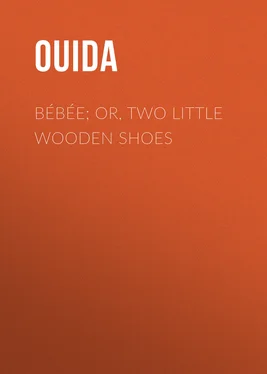Ouida - Bébée; Or, Two Little Wooden Shoes
Здесь есть возможность читать онлайн «Ouida - Bébée; Or, Two Little Wooden Shoes» — ознакомительный отрывок электронной книги совершенно бесплатно, а после прочтения отрывка купить полную версию. В некоторых случаях можно слушать аудио, скачать через торрент в формате fb2 и присутствует краткое содержание. Жанр: foreign_children, foreign_antique, foreign_prose, на английском языке. Описание произведения, (предисловие) а так же отзывы посетителей доступны на портале библиотеки ЛибКат.
- Название:Bébée; Or, Two Little Wooden Shoes
- Автор:
- Жанр:
- Год:неизвестен
- ISBN:нет данных
- Рейтинг книги:5 / 5. Голосов: 1
-
Избранное:Добавить в избранное
- Отзывы:
-
Ваша оценка:
- 100
- 1
- 2
- 3
- 4
- 5
Bébée; Or, Two Little Wooden Shoes: краткое содержание, описание и аннотация
Предлагаем к чтению аннотацию, описание, краткое содержание или предисловие (зависит от того, что написал сам автор книги «Bébée; Or, Two Little Wooden Shoes»). Если вы не нашли необходимую информацию о книге — напишите в комментариях, мы постараемся отыскать её.
Bébée; Or, Two Little Wooden Shoes — читать онлайн ознакомительный отрывок
Ниже представлен текст книги, разбитый по страницам. Система сохранения места последней прочитанной страницы, позволяет с удобством читать онлайн бесплатно книгу «Bébée; Or, Two Little Wooden Shoes», без необходимости каждый раз заново искать на чём Вы остановились. Поставьте закладку, и сможете в любой момент перейти на страницу, на которой закончили чтение.
Интервал:
Закладка:
This had been taught to Bébée, and she went to sleep every night in the firm belief that the sixteen little angels of the Flemish prayer kept watch and ward over her bed. For the rest, being poetical, as these north folks are not, and having in her—wherever it came from, poor little soul—a warmth of fancy and a spirituality of vision not at all northern, she had mixed up her religion with the fairies of Antoine's stories, and the demons in which the Flemish folks are profound believers, and the flowers into which she put all manner of sentient life, until her religion was a fantastic medley, so entangled that poor Father Francis had given up in despair any attempt to arrange it more correctly. Indeed, being of the peasantry himself, he was not so very full sure in his own mind that demons were not bodily presences, quite as real and often much more tangible than saints. Anyway, he let her alone; and she believed in the goodness of God as she believed in the shining of the sun.
People looked after her as she went through the twisting, picture-like streets, where sunlight fell still between the peaked high roofs, and lamps were here and there lit in the bric-à-brac shops and the fruit stalls.
Her little muslin cap blew back like the wings of a white butterfly. Her sunny hair caught the last sun-rays. Her feet were fair in the brown wooden shoes. Under the short woollen skirts the grace of her pretty limbs moved freely. Her broad silver clasps shone like a shield, and she was utterly unconscious that any one looked; she was simply and gravely intent on reaching St. Gudule to say her one prayer and not keep the children waiting.
Some one leaning idly over a balcony in the street that is named after Mary of Burgundy saw her going thus. He left the balcony and went down his stairs and followed her.
The sun-dazzle on the silver had first caught his sight; and then he had looked downward at the pretty feet.
These are the chances women call Fate.
Bébée entered the cathedral. It was quite empty. Far away at the west end there was an old custodian asleep on a bench, and a woman kneeling. That was all.
Bébée made her salutations to the high altar, and stole on into the chapel of the Saint Sacrament; it was the one that she loved best.
She said her prayer and thanked the saints for all their gifts and goodness, her clasped hand against her silver shield, her basket on the pavement by her, abovehead the sunset rays streaming purple and crimson and golden through the painted windows that are the wonder of the world.
When her prayer was done she still kneeled there; her head thrown back to watch the light, her hands clasped still, and on her upturned face the look that made the people say, "What does she see?—the angels or the dead?"
She forgot everything. She forgot the cherries at home, and the children even. She was looking upward at the stories of the painted panes; she was listening to the message of the dying sun-rays; she was feeling vaguely, wistfully, unutterably the tender beauty of the sacred place and the awful wonder of the world in which she with her sixteen years was all alone, like a little blue corn-flower among the wheat that goes for grist and the barley that makes men drunk.
For she was alone, though she had so many friends. Quite alone sometimes; for God had been cruel to her, and had made her a lark without song.
When the sun faded and the beautiful casements lost all glow and meaning, Bébée rose with a startled look—had she been dreaming?—was it night?—would the children be sorry, and go supperless to bed?
"Have you a rosebud left to sell to me?" a man's voice said not far off; it was low and sweet, as became the Sacrament Chapel.
Bébée looked up; she did not quite know what she saw: only dark eyes smiling into hers.
By the instinct of habit she sought in her basket and found three moss-roses. She held them out to him.
"I do not sell flowers here, but I will give them to you," she said, in her pretty grave childish fashion.
"I often want flowers," said the stranger, as he took the buds. "Where do you sell yours?—in the market?"
"In the Grande Place."
"Will you tell me your name, pretty one?"
"I am Bébée."
There were people coming into the church. The bells were booming abovehead for vespers. There was a shuffle of chairs and a stir of feet. Boys in white went to and fro, lighting the candles. Great clouds of shadow drifted up into the roof and hid the angels.
She nodded her little head to him.
"Good night; I cannot stay. I have a cake at home to-night, and the children are waiting."
"Ah! that is important, no doubt, indeed. Will you buy some more cakes for the children from me?"
He slid a gold piece in her hand. She looked at it in amaze. In the green lanes by Laeken no one ever saw gold. Then she gave it him back.
"I will not take money in church, nor anywhere, except what the flowers are worth. Good night."
He followed her, and held back the heavy oak door for her, and went out into the air with her.
It was dark already, but in the square there was still the cool bright primrose-colored evening light.
Bébée's wooden shoes went pattering down the sloping and uneven stones. Her little gray figure ran quickly through the deep shade cast from the towers and walls. Her dreams had drifted away. She was thinking of the children and the cake.
"You are in such a hurry because of the cake?" said her new customer, as he followed her.
Bébée looked back at him with a smile in her blue eyes.
"Yes, they will be waiting, you know, and there are cherries too."
"It is a grand day with you, then?"
"It is my fête day: I am sixteen."
She was proud of this. She told it to the very dogs in the street.
"Ah, you feel old, I dare say?"
"Oh, quite old! They cannot call me a child any more."
"Of course not, it would be ridiculous. Are those presents in your basket?"
"Yes, every one of them." She paused a moment to lift the dead vine-leaves, and show him the beautiful shining red shoes. "Look! old Gringoire gave me these. I shall wear them at mass next Sunday. I never had a pair of shoes in my life."
"But how will you wear shoes without stockings?"
It was a snake cast into her Eden.
She had never thought of it.
"Perhaps I can save money and buy some," she answered after a sad little pause. "But that I could not do till next year. They would cost several francs, I suppose."
"Unless a good fairy gives them to you?"
Bébée smiled; fairies were real things to her—relations indeed. She did not imagine that he spoke in jest.
"Sometimes I pray very much and things come," she said softly. "When the Gloire de Dijon was cut back too soon one summer, and never blossomed, and we all thought it was dead, I prayed all day long for it, and never thought of anything else; and by autumn it was all in new leaf, and now its flowers are finer than ever."
"But you watered it whilst you prayed, I suppose?"
The sarcasm escaped her.
She was wondering to herself whether it would be vain and wicked to pray for a pair of stockings: she thought she would go and ask Father Francis.
By this time they were in the Rue Royale, and half-way down it. The lamps were lighted. A regiment was marching up it with a band playing. The windows were open, and people were laughing and singing in some of them. The light caught the white and gilded fronts of the houses. The pleasure-seeking crowds loitered along in the warmth of the evening.
Bébée, suddenly roused from her thoughts by the loud challenge of the military music, looked round on the stranger, and motioned him back.
"Sir,—I do not know you,—why should you come with me? Do not do it, please. You make me talk, and that makes me late."
Читать дальшеИнтервал:
Закладка:
Похожие книги на «Bébée; Or, Two Little Wooden Shoes»
Представляем Вашему вниманию похожие книги на «Bébée; Or, Two Little Wooden Shoes» списком для выбора. Мы отобрали схожую по названию и смыслу литературу в надежде предоставить читателям больше вариантов отыскать новые, интересные, ещё непрочитанные произведения.
Обсуждение, отзывы о книге «Bébée; Or, Two Little Wooden Shoes» и просто собственные мнения читателей. Оставьте ваши комментарии, напишите, что Вы думаете о произведении, его смысле или главных героях. Укажите что конкретно понравилось, а что нет, и почему Вы так считаете.












